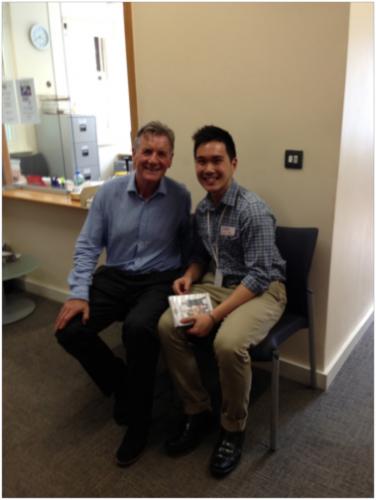
Blog by Voon Pang
July 30, 2013
Greetings from London! Over the last two weeks I have been busy observing eight remarkable young people aged between 15 and 19 work immensely hard so that stuttering had less of an impact on their lives. The transformations by Day 10 were extraordinary and although everyone was exhausted (speech language pathologists included!), the process of change had well and truly established itself for further positive change throughout the year.
The course was co-facilitated by two specialist speech language pathologists (SLP), with extra assistance from another SLP working at the centre, and two University College London SLP students. Five overseas SLP trainees from Germany, Belgium, Greece and Hong Kong (including myself from New Zealand) observed the sessions throughout the two weeks. General aims of the 10-day course, included speech management, improving communication skills and facilitating and maintaining cognitive change, all within the person’s environment. A one-day parent workshop was also included to help parents understand the aims of the course and to provide opportunities to learn more about how they could help their teenagers take ownership of their stuttering as they transitioned into adulthood.
Guest speakers varied from a successful businessman who stuttered to a previous young adult course attendee to a professor in speech language pathology who stuttered himself. We were all also in for a treat when Michael Palin himself visited the centre to spend 2 hours of his time with everyone for a Q and A about stuttering, its impact on his father and strong words of encouragement for these young people to keep on talking.
The thing that I took away from the whole experience was the comprehensive and multifaceted approach the SLPs applied to helping these teenagers. Although fluent speech practice played a role in reducing stuttering, activities focused on desensitisation, self-monitoring, discussions on communication skills and stuttering, reinforcing individual strengths and resilience, perfectionism and their speech and voluntary stuttering. Behavioural experiments (taken from cognitive therapy and our sister field of psychology) were also used to test unhelpful beliefs and to help the young people cope with their thoughts and feelings about stuttering and listener reactions. One of the key messages that was also reinforced throughout the course was that each teen had choices on what they wanted to do and that they were free to make their own choices on using speech technique and taking risks in expanding their comfort zones in life.
Feedback from the teenagers included feeling more relaxed about stuttering, having more positive thoughts about stuttering, viewing stuttering as a small part of their overall communication skills, increased confidence and social participation and more openness about their stuttering.
I would like to thank the participants of the course for letting me sit in to observe their personal journey to changing themselves as people who stutter. I would also like to thank the staff at the Michael Palin Centre (MPC) for showing me ways of being more effective and the art of ‘throwing the ball back’ to clients to help them discover what works for them. I still have another week of training at MPC and can’t wait to learn more before heading back to the southern hemisphere in August!
For more information on the Michael Palin Centre for Stammering Children, go to their website: www.stammeringcentre.org






 Podcast
Podcast Sign Up
Sign Up Virtual Learning
Virtual Learning Online CEUs
Online CEUs Streaming Video Library
Streaming Video Library